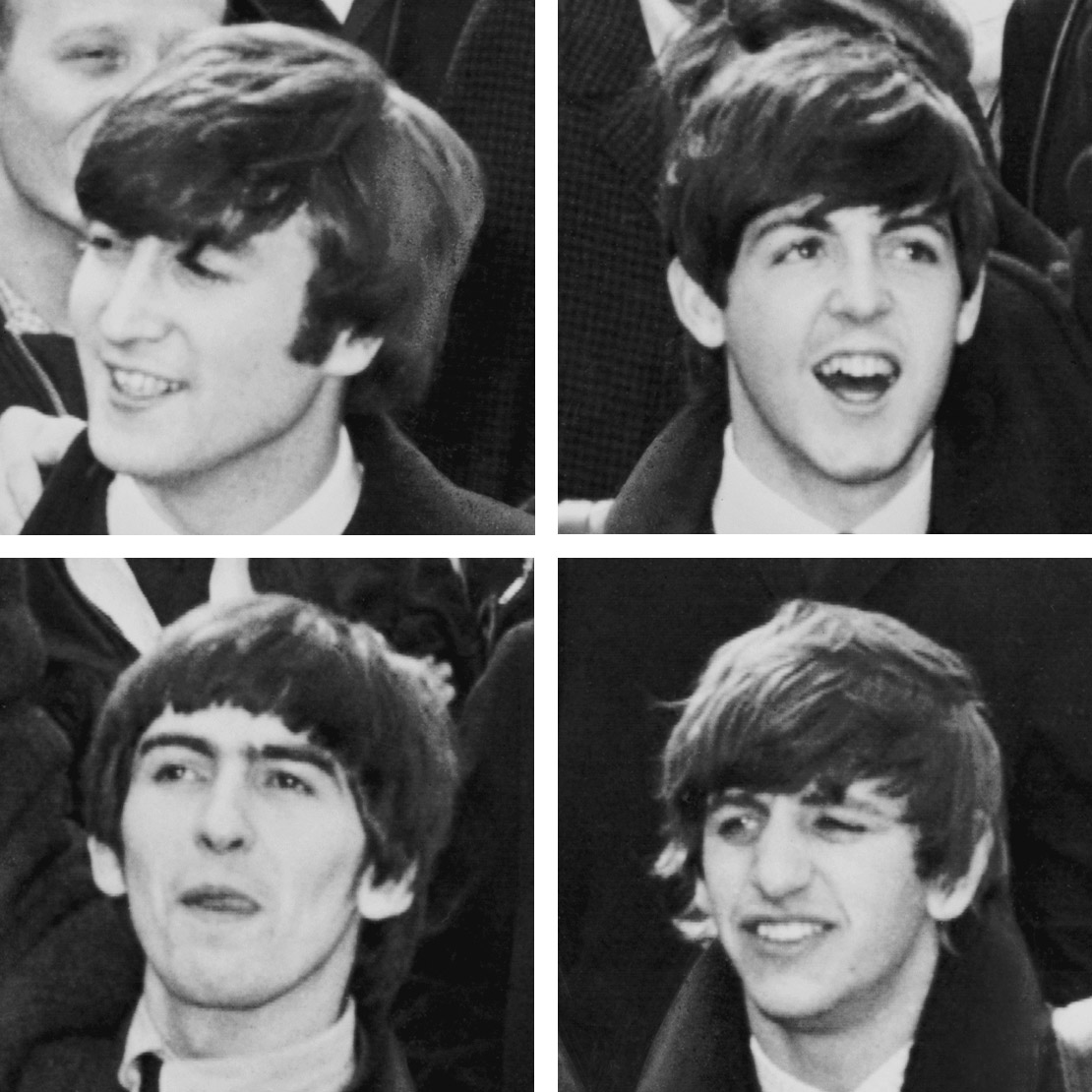
The Beatles arrived for their first concert in the United States on February 11, 1964 to rabid fanfare. Legions of screaming women greeted John Lennon, Paul McCartney, George Harrison, and Ringo Starr on every stop of the U.S. tour, leading to observers dubbing the period as “Beatlemania.” As one of the most commercially successful and influential musicians of all time, almost every pop music artist cites their influence over their music. Yet who were the Beatles? What was their music like? And why were they so popular?
Ph.D. student in history Eddie Watson takes us deep into the history of the Beatles first tour in the United States, and reveals why we should understand these popular cultural movements. But perhaps most importantly, Eddie tells us who is the best Beatle, reveals their greatest hits, and regales us of his own attempt at the Beatle bowl cut.
Guests
 Edward WatsonDoctoral Candidate in History at the University of Texas at Austin
Edward WatsonDoctoral Candidate in History at the University of Texas at Austin
Hosts
 Augusta Dell’OmoDoctoral Candidate, Department of History, The University of Texas at Austin
Augusta Dell’OmoDoctoral Candidate, Department of History, The University of Texas at Austin
Hi, everyone. My name is Augusta Dell’Omo, and I’m here today to talk with graduate student Eddie Watson, who’s in the history department at UT. He is a specialist in modern British history with a particular focus on popular music. And today, Eddie’s here to talk with us about the 55th anniversary of the Beatles first concert in the United States. This was on February 11 – the Beatles first landed in New York City, and then went to Washington, DC to play their first concert in the US. So Eddie, thank you for being here with us.
Thank you for having me.
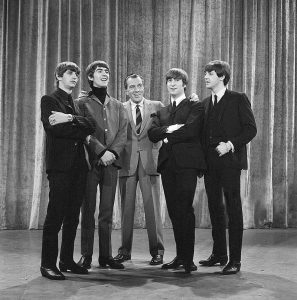
So first, let’s start off with who are the Beatles for those who don’t know.
Yeah, this obscure little band
Right this, highly unpopular, very, very mysterious.
The Beatles were made up of John Lennon, Paul McCartney, George Harrison, and Ringo Starr four young men from Liverpool in England. They are one of the most commercially successful musicians of all time, and they have 272 million certified sales worldwide. And it’s claimed the actual figures more like 600 million. They’re not only one of the most commercially successful musicians of all time, but they are widely acknowledged as being one of the most culturally influential too – almost every pop music artists since then, and still to this day, could cite them as an influence. And in a way, they really kind of captured the zeitgeist of the 1960s more than anything else, they really encapsulated a mood and their career trajectory kind of correlates to a lot of the overriding mood of the 1960s. So by the beginning, they’re young, energetic, modern, new, stylish by the end of the 1960s. They’re displaying more influences from the counterculture -and it’s no coincidence that they split in 1970. The end of the Beatles to many signified the end of that early optimism of the 1960s.
And so I know you mentioned earlier that they’re out of Liverpool. Is that where they came from? And what were some of their early musical influences?
Yes. So the Beatles part of this generation that grew up with the welfare state. As teenagers, they had unprecedented spending power. Liverpool itself, many British cities focused on reconstructing their city centers in the aftermath of World War II. In fact, the Labour government under Clement Attlee introduced the Town and Country Planning Act in 1947, which encouraged local governments to prioritize the central area of a city as the space of cultural, social, and political importance. And because of a lot a lot of these towns and cities were vital to British industry, they were overwhelmingly working class and as such working class people were often at the center of civic reconstruction. Liverpool, however, had not been too extensively bombed and the local council run by the Conservatives didn’t really show much interest in reconstructing the city center. So for Liverpudlians, their sense of pride really derived from the fact that it was a bustling port. There was a perception that the port connected the city to a wider, modern metropolitan world. It was a world very far removed from the derelict city center that seemed to be dull, neglected, and falling apart. As a result the people of Liverpool had a unique access to American records and some of the Beatles earliest influences include Buddy Holly, Chuck Berry but also, a lot of the Motown groups so they really kind of converging two of the main popular music styles of the time.
And so how would you describe the musical style of The Beatles, because most of us have heard a Beatles song, know a couple, but cohesively, how would you describe their style, especially early on?
So the Beatles develop their style in a relatively short space of time. Their career spanned just seven years, and they often release an album every six months or so. Later in their careers, they kind of adopt many elements of psychedelic rock, those associated with countercultural movements, as well as numerous influences from Indian music, mainly from George Harrison, but always maintained elements of Rock ‘n Roll. However, British artists were often carbon copies of successful American acts as well at the time. But the Beatles were different in a few ways. First of all, they played their own instruments, which was unlike Elvis Presley, who was the most popular at that time before them. Secondly, they were influenced by a multitude of American acts, creating something new, as I said, by blending the more the melodies of Motown with the Rock ‘n Roll instrumentation and that’s kind of what redefine their early albums in particular. The use of harmonies is something especially part of their initial success. So Lennon and McCartney pretty much harmonizing on every single song with George Harrison contributing sometimes as well. Thirdly, they had their own personalities, all that kind of thing. You can vaguely describe a star quality. So for example, everyone had their favorite Beatle.
And who is your favorite Beatle?
My favorite Beatle? That’s a great question. Um, I’m going to go with Paul McCartney.
Okay.
Gonna stick with him.
Why?
I think he, he gets under sold as a bassist. And a lot of those melodies are really interesting. And he kind of he has out, of the Beatles songs, I feel like he has the most. I mean, there’s some that are not as strong as the others.
But yeah, so everyone has their favorite Beatle.
Another thing is that hairstyles were unusually long for the era. As everyone kind of knows the Beatles bowl cut. I sported one myself when I was 17 years old.
Excellent. Hopefully, we can get some pictures to put on the website for that.
Yeah, that was a I used to have it as my driving license for way too long.
For far longer was longer than socially acceptable.
Yes. On top of this, their manager Brian Epstein suggested that they adopt a more professional approach to performing and so he sent them off to a local tailor and got them into suits. So you’ve got this kind of element of respectability, wearing a suit, but also this kind of new, more fashionable, which is an odd thing to in hindsight, fashionable haircut,
Are you familiar with how they met and how they sort of got together?
It’s been more gradual. Yeah. So John Lennon starts bank called the Quarrymen who are a skiffle group and then Paul McCartney turns up to one of their shows when he is I think fifteen years old and he incorporates him into the group and they start writing songs together at quite a young age. Then George Harrison is next I think but the Ringo Starr being added is one of the more interesting because they did have another drummer before and the bassist but they got rid of them into made Paul McCartney play bass, and they recruited Ringo Starr from a local group.
Yeah, so they were kind of pieced together.
Yeah, pieced together gradually.
And so you talked a lot about their concerts, their image, their musical stylings, is this how they generated excitement in their music? Or were there other elements that did that and what made them more successful than other artists because this really was a period of experimentation like you talked about in the 60s?
The Beatles paved the way really for British Rock ‘n Roll acts. So before them, British artists had little to no success in the US market. By 1963, only three British artists had topped the Billboard Hot 100 since it began in 1958. And only one artist had done it before then. One of those was born in London, but basically raised in the United States. That’s David Rose and other was a clarinetist. Mr. Acker Bilk. And finally, the other word instrumental group called the Tornados. So basically, they’re pretty much the first rock ‘n roll group who play their own instruments and have the vocals themselves. So early on, the Beatles were formed in 1960, and soon after their self-described manager Alan Williams arranged a residency for them. in Hamburg, it was mostly at strip club, that’d been converted into a music venue…
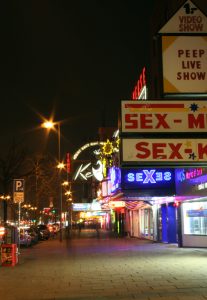
Classy venue.
Yes, and when, when they’re in Hamburg, this is really when they refine their live show. They are playing every night it told them how best to preserve that voices for consecutive shows and things like that – it also expose them to the nightlife and as young teenagers there’s plenty of speculation as to what went on in those sort of early years as you can imagine. And then during the next two years, the Beatles periodically resident in Hamburg and in between this they perform at the Cavern Club in Liverpool. And then in November 1961 is when they meet Brian Epstein, who was a local record store owner, they appointed him as their manager. In January 1962 he began negotiating record contracts. And they were assigned to George Martin under EMI’s Parlophone label. In terms of singles they initially released “Love Me Do” in October 1962, which peaked at number 17 in the UK’s Record Retailer chart and after that modest success, they in January 1963 released the single “Please Please Me” and this is the one which really kind of puts them to stardom in the UK at least it goes straight to number one and it starts a string of hits which ultimately ends up with a record breaking 17 British number one singles. “She Loves You,” which was released in August of 1963, was the fastest selling record in UK history at that time, with 750,000 copies sold in just under four weeks. The band toured the UK three times in the first half of 1963, and gained a reputation for their kind of comical and cheeky attitude to all of the new media attention they were getting.
Soon enough we start seeing the things we typically associate with earlier Beatlemania which is the creative rapturous enthusiasm, and screaming fans as they often deposed the headline acts that they were touring with, due to audience demand. So they would just be like, the audience would keep chanting for the Beatles, even before that played and after that played, so eventually, they just bump them up to the top of the list everywhere they went. In late October, the Beatles toward Sweden for five days. And on their return, several hundred screaming fans were waiting for them at the airport in the pouring rain. Several journalists and photographers were there to some of whom were from the BBC. And this kind of scene would become very familiar also in the airport that day happened to be Ed Sullivan and his entourage. And he actually thought the reception was for a member of the royal family. So that’s when he first sort of became aware of who they were. This fervent atmosphere was soon dubbed by the presses as “Beatlemania”
And authorities were seriously concerned that there was something psychologically wrong with all of these young screaming girls. There’s kind of a sexualized undertone of the mania. And this is reflective of an increase in the interest in like sexual knowledge and celebrity culture in the press. So they were Yeah, a lot of the media types were very sort of baffled by this success. And it was deemed to be a real problem. So they actually – a lot of these reports pointed out how many police resources we’re going into keeping the Beatles safe. And a lot of the appeal of the early songs were because they were directly addressing the audience. So yes, you know, “I want to hold your hand, right.”
And they take that as my hand literally.
Yeah, it’s like they’re communicating directly to them. But Paul McCartney was adamant that the Beatles needed a big hit in the US before going on tour. George Harrison had visited his sister in Illinois in 1963 and felt fairly despondent by the lack of reaction to the Beatles music. So he got it played on the radio. And they had this exclusive access talking to George Harrison, and then to very minimal listener enthusiasm.
And so what is it that actually – what is the single or that gets that traction in the US?
The first one in December 1963, only a few weeks after JFK was assassinated. There was a DJ Carl James in Washington, DC and he plays “I want to Hold Your Hand” on air and it was given to him by a fifteen year old girl from Maryland named Marcia Albert who’d watched a CBS report. She’d like what she’d heard got a copy of the single from a British Airways flight attendant. And in her letter to the DJ, she claimed, “why can’t we have music like that here in America?” Taped versions of the broadcast soon circulated on other radio stations throughout the US and demand for the single was so high that Capitol Records brought forward the release date to December 26. So started off being sort of shelved this, you know, this British band, some people seem to like over there.
And so when they arrive in the US after the singles played, and then there starts to become this momentum for them was there a sense that they brought fresh hope or optimism, especially because of the really desolate atmosphere in the US after the assassination? Was there a sense that that was something that they were bringing?
This is a really interesting question. American rock music critic Greil Marcus suggests that this is something we’ve kind of created when looking back at the Beatles first trip to the US. I would say that there’s some connections that we can make between the JFK assassination and the arrival of the Beatles, even if people weren’t particularly articulating it at that time. And that’s not to say that the Beatles would only have been successful because the country is in shock. But it was very timely. So in December 1963, CBS ran a report that was actually pulled from the day that JFK was assassinated. And in it, they’re reporting on the Beatles phenomenon in the UK. The reporter Alan Kendrick epitomizes this kind of attitude from older the generations towards the Beatles, calling them four lads with quote “dishmop hairstyle.”
Doesn’t seem like an inaccurate depiction.
And included all the kind of usual scenes you see, you know, screaming fans, but it also crucially included the live footage, which was where Marcia Albert first saw the Beatles performing. Also on his point, Kendrick concluded that the Beatles make, quote “non-music and wear non-haircuts.” And there’s a lot of things you can say about the haircuts, but I wouldn’t call it a non-haircut.
It’s definitely a choice.
Very much a haircut. So young people saw the footage for themselves, and the fact that it kind of annoyed him an adult and excited British teenagers definitely appealed to them. And likewise, in December, the Baltimore Sun warns how America had better take thought as to how it will deal with the invasion wondering if “a Beatles go home” sign would do the trick, which evidently it did not.
So can you talk a little bit about some of the successes of the tour and maybe some of the problems that they encountered – beyond the adult scrutiny of the haircuts.
So they land on February 7, 1964 at JFK to a screaming crowd of around 5,000, and in some of their first press conferences, they took questions kind of in the same stuffy kind of tone. So stuff like they’re just a bunch of other Elvis Presley’s, cutting their hair – it always comes back to the hair with the Beatles and they kind of they take it in stride and give the banter quite right back. And so again, it’s part of their comical nature with this kind of thing. They were booked on “The Ed Sullivan Show” on February 9, and their highly anticipated performance drew 73 million viewers in approximately 23 million households, which we can estimate is around 34% of the American population at the time, which was a record for US television. Definitely a record for “the Ed Sullivan Show.” And during the first week of April 1964, The Beatles occupied twelve positions on the Billboard Hot 100 Singles Chart including the top five which is kind of where we’re going to again with a lot of streaming services and things like that getting a lot of, you know, Ed Sheeran songs, yes, it’s that kind of it’s that kind of thing. But the first tour lasted just ten days so in August of 1964, they come back again for a wider US tour. And this is when they kind of experience more of those problems. In Vancouver and British Columbia, 7,000 fans rushed the stage and around 240 ended up in hospital. Police in many cities were not especially prepared for this kind of phenomenon they thought was going to be another Elvis or something like that. They weren’t quite expecting how rowdy these crowds are going to be and there’s some great footage of policemen holding their ears the screens which is great.
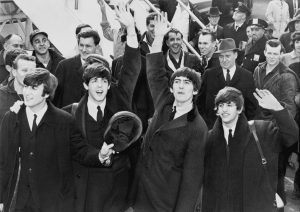
One of the main problems they had while touring the US was the lack of adequate sound equipment so for example in Shea Stadium in 1965 they’re basically being played over the Tannoy system at a baseball ground and you can imagine that doesn’t sound particularly high quality but also most of their shows their sound equipment just not equipped to deal with the noise of the fans screaming. So that’s why whenever you go back and look at old footage that’s the that’s the main thing you’re hearing – you can’t actually get much their music from there. In a more serious way in in Jacksonville, Florida, the Beatles were due to play to a segregated audience. Paul McCartney was very open about his opinion, which I think gave Brian Epstein a minor heart attack. to DJ Larry Kane, he said – “it’s a bit silly to segregate people. I just think it’s stupid. You can’t treat other human beings like animals. That’s the way we all feel. And that’s the way people in England feel.”
So what happened was the Beatles threatened to refuse to play in Jacksonville unless the audience would be integrated and rather than risk the wrath of disappointed Beatles’ fans, the promoters agreed. So in future, they made integration part of their contractual obligation to be playing but by 1966 touring becomes a lot more hazardous. The KKK picketed outside many of their shows threatening to assassinate them. John Lennon’s comments about being bigger than Jesus that are very famous. There was a huge backlash to that, particularly in the US. And as I said as they played in biggest stadia, they came up with problems like at Shea Stadium, whether amplified over the Tannoy and then at Dodger Stadium, in LA. Fans, rushed the stage which led to a clash with authorities. And it took about two hours to restore order. So this kind of results in the Beatles stopping touring altogether because they become very disillusioned with the whole thing. And that’s around 1966. And that’s when they really start focusing on recording studio albums. So they stopped doing quite so many covers, which they did in the first few albums. And they start focusing on original stuff. And this is where they display more influences from countercultural things. So this is when they start thinking of “Rubber Soul” and Revolver, they start incorporating more indie music into the things they start experimenting a bit more. And this is where sort of the later part of the Beatles career really starts to get going the sort of “Sgt. Pepper’s” era and beyond.
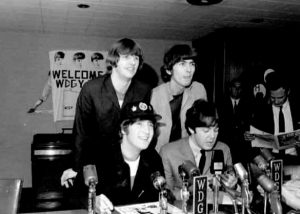
And so when we’re thinking about just the end of the Beatles, so you mentioned at the beginning that they break up around 1970. And I, you know, I think that I have a sort of vague understanding of what happens. But, you know, I think a lot of there’s a lot of misconceptions about why the Beatles breakup and then with the assassination of John Lennon, that that kind of masks that…so can you talk a little bit about the end of the Beatles, and their breakup particularly how it’s reading relating to that period as a whole?
Sure. So the Beatles last album is “Let It Be.” And those sessions are notoriously known to be fractious, tensions in the band seems to be high. And this is where the kind of the mythology around Yoko Ono breaking up. The Beatles really starts to
Right, I didn’t want to lead with that. But, yes, that is, you know, that’s what you hear, right? Is Yoko Ono destroyed the Beatles?
Yeah, that classic sort of narrative. And I think that’s, that’s, I think that’s a bit of a misconception. I feel like some of these tensions we start seeing with the touring really start emerging in the recording process as well. So the initial part of the Beatles, and their success is that John Lennon brings the more the more avantgarde stuff related to youth culture there, and Paul McCartney brings more of the pop melodies and they kind of blend them together. And then the Beatles come. So what happens as the decade goes on, is the John Lennon increasingly realizes that he wants to pursue his own more avantgarde sort of style. So you see it in the White Album with “Revolution 9,” which is essentially somebody saying, number nine on repeat to very eerie noises in the background, famously mocked in the in “the Simpsons,” which is quite wonderful. But it seems to me to be more of a an artistic difference. Really, I feel like that John Lennon has realized that that kind of moment of the 60s is starting to be over and he wants to really pursue less commercial and more artistic kind of musical output.
Yeah. And so what would you say then, as the historical significance of the Beatles and really the contemporary memory of them and their tour in the US?
So historians should really try and avoid some of the pitfalls of the fanatical sort of glowing accounts of The Beatles, what Marcus Collins is termed “hagiographical” – hagiography relating to the worshipping of saints. But they also should find a balance between that and the snobbery of academics who have historically viewed popular culture as crass or beneath studying. So there’s a long sort of series of this beginning of when the Beatles are around. So the biologist Julian Huxley called “Beatlemania” “ludicrously orgiastic.” In 1966 educationalist turned psychoanalyst David Holbrook said the Beatles were quote, “a masturbation fantasy” citing, how a glove puppet show featuring the Beatles induced sexual ecstasy approaching orgasm among primary school children. The historian Eric Hobsbawm predicted that the Beatles would endure a slow descent and fade into obscurity, which quite clearly didn’t happen. And then even if it’s nothing sort of drastically wrong, Arthur Marwick kind of covers them, but often gets a lot of the details wrong. So the first chart appearance and the breakup dates a wrong. This really comes from this sort of a tendency to view popular culture is cheap and void of meaning, especially when it comes to looking at youth culture and cultural studies.
So early Beatles stuff in particular, is often dismissed, because it was so popular with young women. So the screaming, more sort of commercial side of things, which kind of ignores the role the mass communication has in imagine communities. But also this this kind of narrative ignores the fact that they did have sway among older countercultural audiences by the late 1960s, and it kind of ignores they’re almost universal appeal. So there’s not really – I feel like with the Beatles stuff, people like the old stuff, or they like the new stuff better, but they still will like their whole catalog. But I feel like the Beatles should really be placed in sort of context by saying that although too many of these sort of social and cultural change of the swing 60s are in many ways very limited. Anyone with a disposable income could have access to a Beatles record, it was more transformative on a personal level and allowed individuals to connect with a wider global phenomenon surrounding youth culture. There’s also a cultural heritage we have to take into account as well. So over the past few years Liverpool museums website is claimed that tourism brings about 20 million pounds a year to the city, most of which is believed to be based off of the Beatles. It’s been claimed that there’s been a 66% growth in economic value of the visitor economy there from 2009 to 2017 so there has been a particular spike recently as well so this isn’t something that has just always been there, well the Beatles have obviously been very famous since they arrived, that’s kind of more of as they’ve got further away in time there’s been an increase in sort of that kind of remembrance and cultural heritage.
Yeah I mean it also seems particularly applicable today because of the celebrity fan culture right people talk about “Stan culture” on the internet which is you know the rabidly devoted fans that will just trash other celebrities on the internet that it seems very similar to some of the things that you’re talking about.
Yeah, it is very similar, the sort of this narrative that you have a Rolling Stones fans or Beatles fan. Yeah, and I mean, the reality is, there’s way more crossover, then people like to make out but definitely, it’s definitely a part of it.
As for the sort of contemporary memory of the Beatles tour, their performance on “The Ed Sullivan Show” is perhaps one of the moments that kind of lingers longest in the memory: it’s a moment that clearly signifies that they’ve arrived in America. It wasn’t their best performance musically as such, but the excitement that generated and nails directly into people’s households across America was really significant. But there’s also the role of the transistor radio and how they develop, so there’s really a technological side to this, which was something that was relatively new, especially on that kind of scale, like they’ve always been musicians before. But this is the first time that is really in people’s households. And it kind of goes back to that intimacy part again, where it’s directly connecting the band to the listener. But also “the Ed Sullivan Show” and their US tour features prominently in Ron Howard’s 2016 documentary Eight Days a Week which really outlines how the tension start creeping in in the middle of their career.
Obama honored McCartney at the White House in 2010 awarding him a Library of Congress Gershwin Prize, he said, that they quote, “helped to lay the soundtrack for an entire generation, and that they changed everything overnight.” So while this is hyperbolic, in, in a lot of ways, this is how it’s remembered. And this in and of itself, is pretty interesting. And I think that the tour really demonstrates how big the American market was both quantitatively and in terms of global influence. So American popular culture starts becoming more and more ubiquitous in international youth culture. And if that’s not been as successful as it was, then there’s a good chance to a lot of the cultural mythology around the Beatles generally may be completely different. And that tour really places the Beatles onto a global stage. And it had unintended consequences to pushing them towards creating more studio albums. But I think it goes back to this idea again, of the Beatles arriving and restoring the optimism and hope of the early 60s as a nation was mourning the death of a young and energetic president. And again, even though it’s not something that was really articulated too much at the time, there is, you know, the news report that leads to them being played on the radio more I don’t think it’s a coincidence that it’s pulled because of JFK’s assassination. And they, it comes back again in December. There’s a reason why that they chose to replay it again in December, I think
I have one final question you – Eddie, what is your favorite Beatle song?
Such a hard question.
You can pick a couple!
Okay. Um, I’ll pick one from each little era. There’s like there’s like the earlier 63-65 the middle kind of era, which is pretty much 65-66 and then later. So I’ll go the earlier era, I think “Please Please Me” as my favorite song. I think that that’s where Lennon and McCartney’s harmonization really comes out well. a close second would probably be “She Loves You” from that part. I really like the kind of cheesy major sixth note that of the year that it ends on because it’s essentially John Lennon, Paul McCartney, and George Harrison all sing a different note. But it comes to this really kind of flat odd sounding one. From the middle era: there’s a track on Revolver called “She Said, She Said” which is everyone always says Ringo Starr is not a good drummer, and that’s kind of a really good counterpoint to that. And apparently, John Lennon said that Ringo Starr wasn’t even the best drummer in the Beatles.
Yes, I have heard that one.
Yeah. Yeah, that’s a great quote. But that’s more because apparently, Paul McCartney is an excellent drummer. But, you know, we’ll see. And that might be, you know, trying to dig him out of a hole. Something from the latest stuff. I’d probably pick, “Hey Bulldog,” which has got this really great opening riff to it. And that’s actually one of the first Beatle songs I enjoyed. Yeah, it’s a really random one.
Awesome. Well, on that note, thank you, Eddie, for coming. And this has been another great episode of 15 minute history. Thank you for listening.
Thank you.